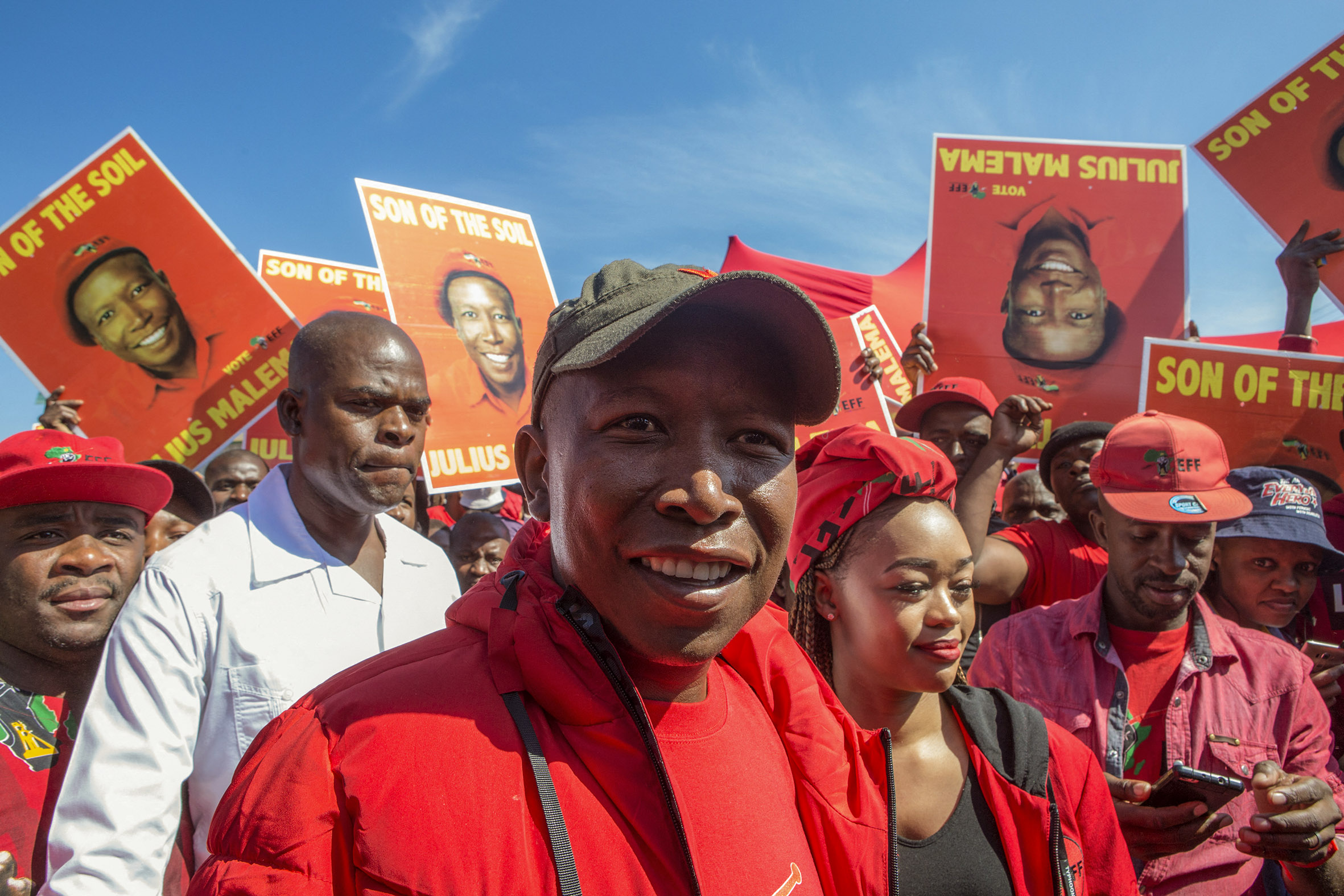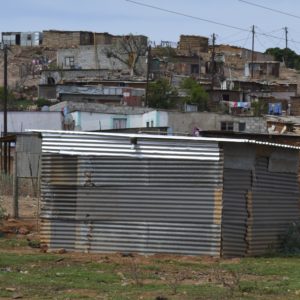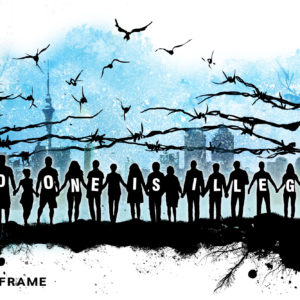The EFF surrenders a key progressive principle
The party’s reckless descent into xenophobic politics is an alarming development. Building a counter-politics of solidarity is essential.
Author:
21 January 2022

Until recently, the EFF’s sternest critics had to concede that the party had held a principled line on xenophobia towards African migrants. With all the major parties taking xenophobic positions, the EFF, an entirely unscrupulous organisation in other respects, seemed to hold to a principle rooted in a commitment to pan-Africanism.
But now that the EFF has assumed the role of the police and turned to showing up at restaurants to threaten staff and demand a reduction in the number of migrants employed, principle has given way to opportunism. Given the EFF’s authoritarianism, its record of violence and its intimidation of retail workers during the party’s periodic trashing of shops, its actions this week must have been deeply alarming for the workers at the restaurants targeted.
This is not just the politics of spectacle, carried out in the shopping mall. It is also a politics of sadism that gives young people who have been scorned by society a temporary sense of power legitimated as virtue. This is, as anyone with even the most basic understanding of history will know, a very, very dangerous substitute for building real social inclusion.
Related article:
The EFF may have some control over how its “ground forces” conduct themselves in this turn to organised xenophobia. But it’s one thing to start a fire under controlled circumstances. It’s another to throw petrol on an already out-of-control fire.
The EFF’s actions do not only take place in a context where political parties are taking dangerous right-wing positions on migration, with ActionSA and the Patriotic Alliance being among the most crude. They also take place in a society in which there is a general dehumanisation of migrants and both the formal and informal power exercised by the state is routinely xenophobic. Small but vociferous xenophobic organisations such as the self-proclaimed Umkhonto weSizwe veterans who trashed migrant stalls in Durban and the All Truck Drivers Foundation engage in xenophobic violence with impunity.
Escalating violence
South Africa is a relentlessly violent society and xenophobia frequently takes the form of street violence, often murderous. In most instances there has been impunity. One of the few people to have been convicted and sentenced for xenophobic violence is Vusi Khoza, the chairperson of the EFF in KwaZulu-Natal. A court found that in 2009, when he was an ANC councillor, he had participated in a xenophobic attack in Albert Park in central Durban. Two men, a Zimbabwean and a Tanzanian, were murdered during the attack.
Violence is increasingly organised and, in some parts of the country, steadily more institutionalised in party politics. In many wards in Durban local ANC structures now include “business forums”, usually openly armed organisations that, in classic Mafia style, demand access to tenders and private business, often under open threats of violence. In some parts of the city, it is now common for people making deliveries to be stopped, told to turn back at gunpoint and the business for which they are making the delivery visited and forced to contract that delivery work to the local “business forum”. It is all too easy to imagine a situation in which this turn to institutionalised gangsterism could intersect with xenophobia with horrific results.
Related article:
It is also important to be mindful that there is a now long history of politicians actively seeking to incite regional and ethnic divisions. Helen Zille’s comments about people from the Eastern Cape being “refugees” in the Western Cape are well known. In the elite public sphere, it is less well known that ANC politicians regularly tell people living in shacks that they cannot expect to get government support while they have “foreigners” among them. In Durban it has, for years, been routine for ANC politicians to tell people that they do not have decent housing because the province has been “flooded” by people from the Eastern Cape. Sometimes derogatory language is openly used to describe amaMpondo. This has resulted in violence on occasion.
If someone from Flagstaff is presented as being an illegitimate resident of Durban it is clear that someone from Lilongwe, Harare or Karachi has no chance of receiving a warm reception.
The politics that seeks to tie rights and entitlements to “legitimate” occupation of place is fully developed in many areas under traditional authority, but it exists in other forms too. In urban neighbourhoods, there are often divisions between communities based on which families are seen to have been the original residents and which are seen as newcomers. In some cases, the “newcomers” are people whose families arrived in an area to escape the political violence of the 1980s. In the context of mass impoverishment and the desperation that it creates, the routine way in which rights and entitlements are, in practice, tied to identity and place of origin is an extremely dangerous situation.
Heart-breaking chauvinism
The global turn to xenophobic politics by the Right, and the increasing complicity with xenophobia by liberals and social democrats, has led many to assume that it is a contemporary phenomenon. It is often ascribed to the neoliberal politics that have produced a steady decline of the institutions that sustain social solidarity, the decline of the Left in electoral politics and as an organised force in society, and changes to the public sphere brought about by social media.
These are all valuable lines of analysis. But there is also a long history of xenophobia in the formerly colonised world. Elites have repeatedly sought to scapegoat migrants, along with ethnic minorities, as the people become aware of what Frantz Fanon called the “treason” of their rulers. In 1961, he wrote that “foreigners are called on to leave; their shops are burned, their street stalls are wrecked”.
He could have been writing about the EFF when he remarked that “we observe a permanent see-saw between African unity, which fades quicker and quicker into the mists of oblivion, and a heart-breaking return to chauvinism in its most bitter and detestable form”.
Related article:
The EFF’s conduct could hardly be more reckless, unprincipled and contrary to the values of the pan-Africanism that the party once espoused. The party’s politics is, at its centre, a form of authoritarianism and nationalism that has taken on predatory dimensions in recent years. But the party also claims Left credentials along with pan-Africanist commitments.
There is nowhere on the planet where an organisation on the Left could credibly engage in intimidatory visits to restaurants to enforce quotas on the employment of migrant workers. It is indisputably and universally a politics of the Right. For many, the targeting of shops evokes a standard tactic of fascism – from Nazi Germany in the 1930s through to contemporary India. It is a basic axiom of any progressive politics that, as French philosopher Alain Badiou puts it, “all workers labouring here belong here”.
Restaurant workers are, globally, among the most exploited. They are also among the least unionised. It is now imperative that restaurant workers across South Africa are unionised, without regard for country of origin, to improve their working conditions and, in the great tradition of trade unionism, affirm that an injury to one is an injury to all.



